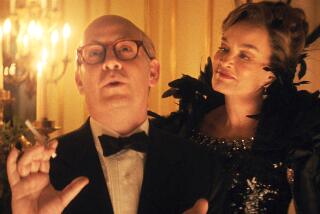Book Review : Hollywood: Feuding, Fussing, Fighting
City of Nets: A Portrait of Hollywood in the 1940s by Otto Friedrich (Harper & Row: $25)
If “City of Nets” is a book full of riches, the kind of wealth it represents and the way that wealth is recorded resembles an antique necklace from another time. The chain (substantial, shining and thick) would be the chronological history of the decade of the ‘40s in Hollywood--all those time links where cinematic history and political folly meshed together in such a fascinating way. Dangling--as it were--from that chain is a series of heavily engraved medallions, stories-within-stories about how particular classic Hollywood films were made.
The movies include “Casablanca,” “Double Indemnity,” “Laura,” “Sunset Boulevard,” as well as some “Frankenstein” epics, and “The Miracle of Morgan’s Creek.” The films are there as marvelous tall tales of the inept, the bizarre, the ragingly stupid: Almost every wonderful movie that got made in the ‘40s, for instance, was offered to George Raft, who turned them all down. These movie stories include, for instance, insane tales of collaboration between people who hated each other: How can we ever take Raymond Chandler seriously again, after reading his written tirade against Billy Wilder? “Mr. Wilder,” according to John Houseman, “was at no time to swish under Mr. Chandler’s nose or to point in his direction the thin, weather-handled Malacca cane which Mr. Wilder was in the habit of waving around as they worked. Mr. Wilder was not to give Mr. Chandler orders of an arbitrary or personal nature such as, ‘Ray, will you open that window?’ or ‘Ray, will you shut that door please?’ ” Wilder himself remembered a few more of Chandler’s grievances: “Mr. Wilder frequently interrupts his work to take phone calls from women. . . . I can’t work with a man who wears a hat in the office. . . .”
Nonetheless, in spite of drunkenness, neurosis, adultery (one of the saddest romances recorded here is the Robert Walker/Jennifer Jones/David O. Selznick triangle which manages--by Otto Friedrich’s combination of objectivity and compassion--to be both funny and heartbreaking), some wonderful movies got made. And some terrible ones too, of course. If “City of Nets” were only the history of this part of Hollywood, it would be useful, amusing, a contribution to our culture.
Chain of Serious History
But again these tales are just medallions, ornamentations on a thicker chain of serious history. This volume’s title comes from Bertolt Brecht’s “The Rise and Fall of the City of Mahagonny.” Its fictional founders maintained that Mahagonny meant “City of Nets”: “Here we’ll have fun . . . Gin and whiskey/Girls and Boys . . .” Brecht himself came to Hollywood from Berlin, one among many European exiles from World War II. Refugees most of them, from the ravening anti-Semitism of Hitler. But these escapees came to this place of easy money and wonderful weather, where the film business was run by Jews who had changed their names and gave annual Easter egg hunts; who worshiped wealth and hated Communists. This social experiment was bound to fail. So, by 1946, as in a giant Ping-Pong game, many of these victims of European cultural and social disaster were about to be slammed back across the ocean.
“City of Nets” is really a history of the larger world: of anti-Semitism, and the artist’s responsibility to his own truth, and what it means to take a shot at being a decent person when the whole world around you is nuts. So we see Stravinsky and Schoenberg and Heinrich Mann and Thomas Mann and Brecht himself, all scrambling to make a buck and still keep their artistic reputations, while, over in another part of town, Louis B. Mayer and Samuel Goldwyn and Harry Cohn--all the fabled warlords of Hollywood--bickered and battled like so many European city states.
World War II ended, and in a matter of a year or two, Hitler was a dim memory. Everyone was furious at Stalin. The House Un-American Activities Committee--with players like J. Parnell Thomas and Richard Nixon--threw their hats in the ring. And soon--so soon, it would seem, that half the people involved hardly knew what was happening--the Hollywood Ten would be clapped in jail for refusing to cooperate with HUAC. And everyone else in town would have to figure out what to do next. Friedrich may lose some fans in this part of the book, since he paints each side as almost equally fatuous, and suggests that the Ten, had they had better legal advice--or taken the advice offered them--might have kept their jobs and avoided prison. To buttress this argument he relies heavily on the hearing transcripts, surely some of the most depressing reading in American history. “Congressman Rankin soon provided his own evaluation of . . . visiting celebrities. ‘I want to read you some of these names,’ he declared on the House floor. . . . ‘One of the names is June Havoc. We found out from the Motion Picture Almanac that her real name is June Hovick. Another one was Danny Kaye and we found out his real name was David Daniel Kaminsky. . . . there’s one who calls himself Edward Robinson. His real name is Emanuel Goldenberg.’ ”
Brecht Played the Fool
Here again, though, is the wily Brecht, testifying like mad to HUAC: “One of Brecht’s friends later remarked that the whole session resembled a zoologist being cross-examined by apes. But if the apes were notable for their blundering ignorance, the zoologist was no less notable for his dissembling. . . .” Brecht was not incarcerated; indeed, he escaped America within days. But to do so he’d had to lie, to recant his dearest beliefs, to play the fool.
In some sense, what else was there to do? Hollywood really was a place where the lunatics had taken charge of the asylum. Toward the end of the decade, the film community made its own statement on the anti-Semitism of the day in “Gentleman’s Agreement.” Ring Lardner’s explication: “ . . . Never be mean to a Jew, because he might turn out to be a gentile.” And Ronald Reagan got a promotion from B flicks. Hollywood still rules.
More to Read
Sign up for our Book Club newsletter
Get the latest news, events and more from the Los Angeles Times Book Club, and help us get L.A. reading and talking.
You may occasionally receive promotional content from the Los Angeles Times.









